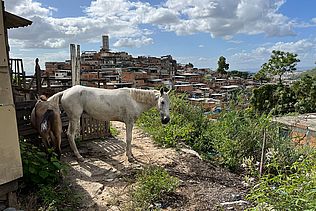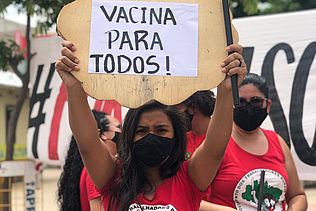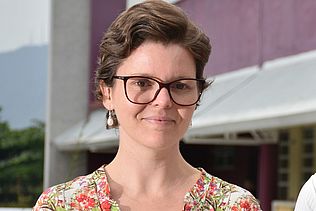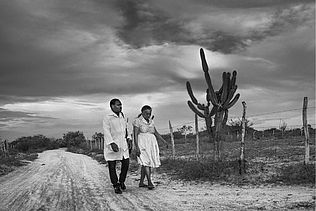Die Brasilianische medico-Partnerorganisation ABIA (Associação Brasileira Interdisciplinar de AIDS) hat einen bedeutenden Erfolg in der Auseinandersetzung um Pharma-Patente und den Zugang zu AIDS-Medikamenten zu vermelden. Das Brasilianische Patentamt (INPI) hat den Patentantrag des Konzerns Gilead auf den Wirkstoff Tenofovir abgelehnt. Für das staatliche Behandlungsprogramm ist Tenofovir eines der wichtigsten zugleich aber auch eines der teuersten Medikamente. Durch diese Entscheidung könnte der Preis nun deutlich fallen.
ABIA lieferte dem INPI Fakten die zeigten, dass die Wirksamkeit von Tenofovir und seine Struktur bereits seit den 1980gern bekannt sind. Damit konnte nachgewiesen werden, dass es sich nicht um eine Neuerfindung des Pharmakonzerns Gilead handelt und folglich ein Patent nicht rechtens wäre.
ABIA wurde 1987 gegründet und hat sich zu einer sehr anerkannten Nichtregierungsorganisation in Brasilien entwickelt. Sie ist insbesondere engagiert im Kampf gegen AIDS und der Verteidigung der Menschenrechte der HIV-Betroffenen.
ABIA Pressemitteilung vom 2.9.2008:
INPI denies patent for the anti-retroviral Tenofovir
Medicine is one of the most expensive of the anti-Aids cocktail; company has 60 days to appeal
The National Institute of Industrial Property (INPI) denied the patent granting
for the anti-retroviral Tenofovir, one of the most expensive and important
medicine used by the STD/Aids National Program. The producer company, Gilead,
has 60 days to appeal, affirmed INPI's press office. However, for those
monitoring the process, there are very little chances to revert the decision.
Tenofovir is currently used by 31,3 thousand patients, accounting for US$ 43,4
millions (around R$ 72 millions) for the government. It is estimated that by
the end of this year, this number will go to 37 thousand people.
Even with the possibility of appeal, the INPI's decision brings a new
perspective to price negotiation of Tenofovir in Brazil. The Secretary of
Science, Technology and Strategic Products from the Ministry of Health,
Reinaldo Guimarães, affirmed that the agreement with Gilead is ending very
soon. "We will certainly ask for a lower price compared to what is charged
today: US$ 3,25 the dose (R$ 5,40)", affirmed. The generic produced by the
Indian company Ranbaxy costs US$ 0,4 (R$ 0,66) per dose. Meanwhile, Brazil
cannot change supplier. Ranbaxy has signed an agreement with Gilead that
prohibits the commercialization of the product in Brazil.
There is another producer, the Indian company Cipla. However, the generic
produced by this company has not yet received the pre-qualification of the
World Health Organization, essential requirement for the commercialization of
the product in the Country. The conclusion of the prequalification might also
take place before the end the year. "Any decision will have to be taken
cautiously. The most important is that there will be no shortage of the
medicine, with whatever decision that will be taken", said the Secretary.
The reportage could not contact Gilead yesterday. The analysis of Tenofovir's
patent began in 1998, but only in April (of 2008) the process was speed-up.
The Ministry of Health declared the medicine of public interest and, with that
act, obtained the priority status (for analysis) at the INPI. Another reason
for the Ministry of Health to ask for the speeding up of the analysis has been
the intention of Gilead to restrict the use by the national aids programme of
generic versions of Tenofovir. In 2006, the company granted a voluntary license
to Indian producers, under the condition that the medicine could not be sold to
Brazil.
"It is a victory. Now, producers will think twice before filing a patent
application for a medicine that doesn´t bring innovation, for the sake of
keeping their monopolies.", said the lawyer from the Rebrip's Working Group on
Intellectual Property (GTPI) and member of the Brazilian Interdisciplinar Aids
Association (ABIA), Renata Reis. In 2007, ABIA and the Oswaldo Cruz Foundation
introduced technical arguments to INPI, showing that the formulation of
Tenofovir did not bring any technological innovation, one of the requirements
for the granting of a patent, according to the Industrial Property Act.
Health declared the public interest
The Ministry of Health published, in April 2008, a decree declaring Tenofovir
as a medicine of public interest. The anti-retroviral is one of the most
expensive and important for the National SDT/Aids Programme. Produced by the
company Gilead, it is used by 30 thousand patients in Brazil and accounts,
alone, for 10% of the expenses of medicines in the programme.
The drug patent was already denied in United States and the expectation is that
the same happens in Brazil. The National Institute of Industrial Property
(INPI) did, also in April, a report not favourable to the granting of this
right.
In June, the Brazilian Interdisciplinary Aids Association (Abia) introduced in
India an opposition against the granting of the patent, which is under analyses
in that country. If the right is granted in India, Brazil will not be able to
import generic versions of Tenofovir produced there.
Abia argues that the medicine does not bring innovation, essential requirement
to have the patent granted. The active ingredient of Tenofovir is already known
since the eighties.
(Lígia Formenti)





